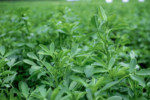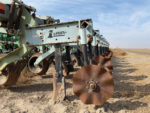Advertise Follow Us
Items Tagged with 'Alfalfa'
ARTICLES
No-Till, Strip-Till Lessen Load for Operation Cropping Year Round
Record corn silage yield in first year of no-till immediately sold farmer on conservation ag practices
Read More
7 Tips for Frost Seeding Cover Crops
Clovers and alfalfa are good choices for cover crop species that can be frost seeded, according to a Penn State expert.
Read More
No-Till, Cover Crops Pay Dividends on Dairy Farm
A pursuit of economical cattle feed leads to full-blown adoption of a diversified no-till, cover crop system.
Read More










